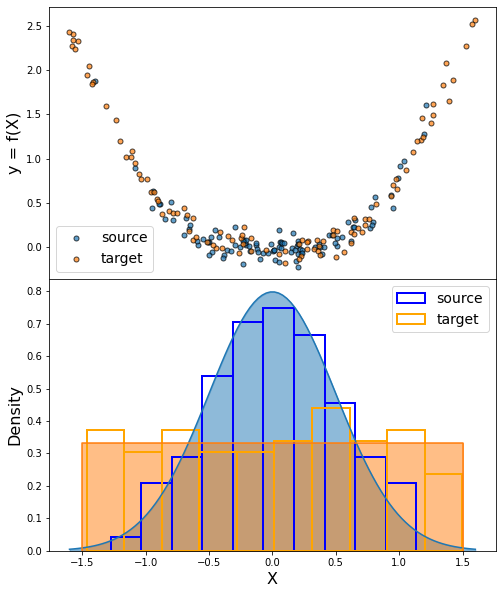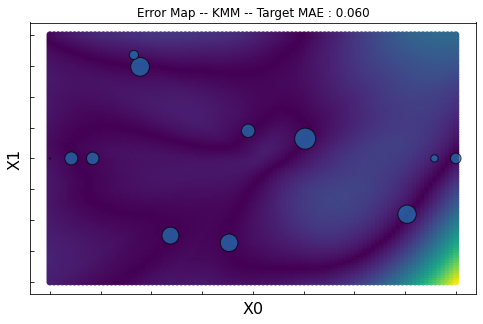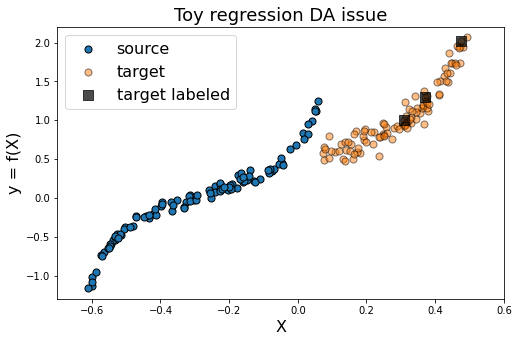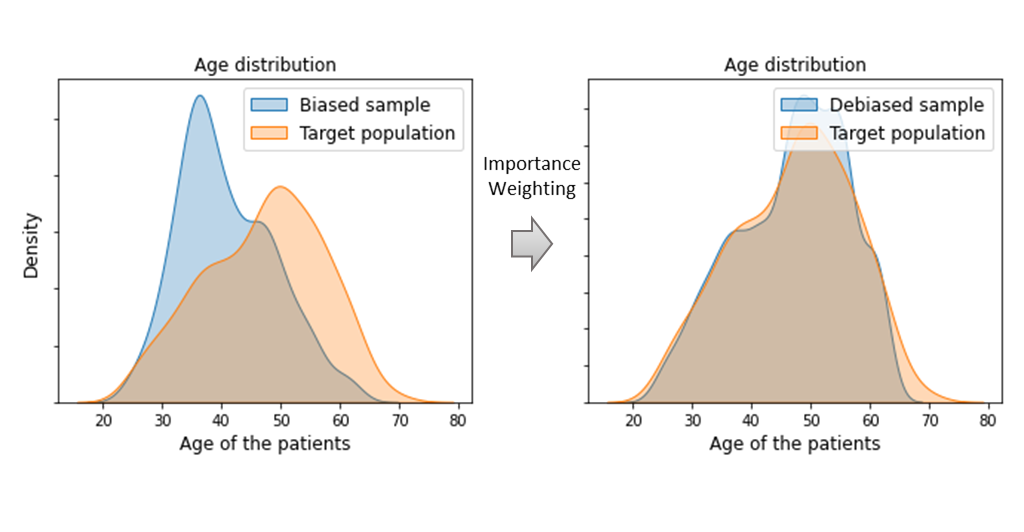adapt.instance_based.KMM
- class adapt.instance_based.KMM(estimator=None, Xt=None, kernel='rbf', B=1000, eps=None, max_size=1000, tol=None, max_iter=100, copy=True, verbose=1, random_state=None, **params)[source]
KMM: Kernel Mean Matching
KMM is a sample bias correction method for domain adaptation based on the minimization of the Maximum Mean Discrepancy (MMD) between source and target domains.
The algorithm corrects the difference between the input source and target distributions by reweighting the source instances such that the means of the source and target instances in a reproducing kernel Hilbert space (RKHS) are “close”.
This leads to solve the following quadratic optimization problem:
\[\min_{w} \frac{1}{2} w^T K w - \kappa^T w\]Subject to:
\[w_i \in [0, B] \text{ and } |\sum_{i=1}^{n_S} w_i - n_S| \leq m \epsilon\]Where:
\(K_{ij} = k(x_i, x_j)\) with \(x_i, x_j \in X_S\) and \(k\) a kernel.
\(\kappa_{i} = \frac{n_S}{n_T} \sum_{x_j \in X_T} k(x_i, x_j)\) with \(x_i \in X_S\).
\(w_i\) are the source instance weights.
\(X_S, X_T\) are respectively the input source and target dataset.
\(B, \epsilon\) are two KMM hyperparameters.
After solving the above OP, an estimator is fitted using the reweighted labeled source instances.
KMM method has been originally introduced for unsupervised DA but it could be widen to supervised by simply adding labeled target data to the training set.
- Parameters
- estimatorsklearn estimator or tensorflow Model (default=None)
Estimator used to learn the task. If estimator is
None, aLinearRegressioninstance is used as estimator.- Xtnumpy array (default=None)
Target input data.
- kernelstr (default=”rbf”)
Kernel metric. Possible values: [‘additive_chi2’, ‘chi2’, ‘linear’, ‘poly’, ‘polynomial’, ‘rbf’, ‘laplacian’, ‘sigmoid’, ‘cosine’]
- B: float (default=1000)
Bounding weights parameter.
- eps: float, optional (default=None)
Constraint parameter. If
None,epsis set to:eps = (np.sqrt(len(Xs)) - 1)/np.sqrt(len(Xs))
with
Xsthe source input dataset.- max_sizeint (default=1000)
Batch computation to speed up the fitting. If
len(Xs) > max_size, KMM is applied successively on seperated batch of size lower thanmax_size.- tol: float (default=None)
Optimization threshold. If
Nonedefault parameters from cvxopt are used.- max_iter: int (default=100)
Maximal iteration of the optimization.
- copyboolean (default=True)
Whether to make a copy of
estimatoror not.- verboseint (default=1)
Verbosity level.
- random_stateint (default=None)
Seed of random generator.
- paramskey, value arguments
Arguments given at the different level of the adapt object. It can be, for instance, compile or fit parameters of the estimator or kernel parameters etc… Accepted parameters can be found by calling the method
_get_legal_params(params).
- Yields
- gammafloat
Kernel parameter
gamma.For kernel = chi2:
k(x, y) = exp(-gamma Sum [(x - y)^2 / (x + y)])
For kernel = poly or polynomial:
K(X, Y) = (gamma <X, Y> + coef0)^degree
For kernel = rbf:
K(x, y) = exp(-gamma ||x-y||^2)
For kernel = laplacian:
K(x, y) = exp(-gamma ||x-y||_1)
For kernel = sigmoid:
K(X, Y) = tanh(gamma <X, Y> + coef0)
- coef0floaf
Kernel parameter
coef0. Used for ploynomial and sigmoid kernels. Seegammaparameter above for the kernel formulas.- degreeint
Degree parameter for the polynomial kernel. (see formula in the
gammaparameter description)
See also
References
- 1
[1] J. Huang, A. Gretton, K. Borgwardt, B. Schölkopf, and A. J. Smola. “Correcting sample selection bias by unlabeled data.” In NIPS, 2007.
Examples
>>> from sklearn.linear_model import RidgeClassifier >>> from adapt.utils import make_classification_da >>> from adapt.instance_based import KMM >>> Xs, ys, Xt, yt = make_classification_da() >>> model = KMM(RidgeClassifier(), Xt=Xt, kernel="rbf", gamma=1., verbose=0, random_state=0) >>> model.fit(Xs, ys) >>> model.score(Xt, yt) 0.76
- Attributes
- weights_numpy array
Training instance weights.
- estimator_object
Estimator.
Methods
__init__([estimator, Xt, kernel, B, eps, ...])fit(X, y[, Xt, yt, domains])Fit Adapt Model.
fit_estimator(X, y[, sample_weight, ...])Fit estimator on X, y.
fit_weights(Xs, Xt, **kwargs)Fit importance weighting.
Get metadata routing of this object.
get_params([deep])Get parameters for this estimator.
predict(X[, domain])Return estimator predictions after adaptation.
predict_estimator(X, **predict_params)Return estimator predictions for X.
Return fitted source weights
score(X, y[, sample_weight, domain])Return the estimator score.
set_fit_request(*[, domains])Request metadata passed to the
fitmethod.set_params(**params)Set the parameters of this estimator.
set_predict_request(*[, domain])Request metadata passed to the
predictmethod.set_score_request(*[, domain, sample_weight])Request metadata passed to the
scoremethod.unsupervised_score(Xs, Xt)Return unsupervised score.
- __init__(estimator=None, Xt=None, kernel='rbf', B=1000, eps=None, max_size=1000, tol=None, max_iter=100, copy=True, verbose=1, random_state=None, **params)[source]
- fit(X, y, Xt=None, yt=None, domains=None, **fit_params)[source]
Fit Adapt Model.
For feature-based models, the transformation of the input features
XsandXtis first fitted. In a second stage, theestimator_is fitted on the transformed features.For instance-based models, source importance weights are first learned based on
Xs, ysandXt. In a second stage, theestimator_is fitted onXs, yswith the learned importance weights.- Parameters
- Xnumpy array
Source input data.
- ynumpy array
Source output data.
- Xtarray (default=None)
Target input data. If None, the Xt argument given in init is used.
- ytarray (default=None)
Target input data. Only needed for supervised and semi-supervised Adapt model. If None, the yt argument given in init is used.
- domainsarray (default=None)
Vector giving the domain for each source data. Can be used for multisource purpose.
- fit_paramskey, value arguments
Arguments given to the fit method of the estimator.
- Returns
- selfreturns an instance of self
- fit_estimator(X, y, sample_weight=None, random_state=None, warm_start=True, **fit_params)[source]
Fit estimator on X, y.
- Parameters
- Xarray
Input data.
- yarray
Output data.
- sample_weightarray
Importance weighting.
- random_stateint (default=None)
Seed of the random generator
- warm_startbool (default=True)
If True, continue to fit
estimator_, else, a new estimator is fitted based on a copy ofestimator. (Be sure to setcopy=Trueto usewarm_start=False)- fit_paramskey, value arguments
Arguments given to the fit method of the estimator and to the compile method for tensorflow estimator.
- Returns
- estimator_fitted estimator
- fit_weights(Xs, Xt, **kwargs)[source]
Fit importance weighting.
- Parameters
- Xsarray
Input source data.
- Xtarray
Input target data.
- kwargskey, value argument
Not used, present here for adapt consistency.
- Returns
- weights_sample weights
- get_metadata_routing()[source]
Get metadata routing of this object.
Please check User Guide on how the routing mechanism works.
- Returns
- routingMetadataRequest
A
MetadataRequestencapsulating routing information.
- get_params(deep=True)[source]
Get parameters for this estimator.
- Parameters
- deepbool, default=True
Not used, here for scikit-learn compatibility.
- Returns
- paramsdict
Parameter names mapped to their values.
- predict(X, domain=None, **predict_params)[source]
Return estimator predictions after adaptation.
For feature-based method (object which implements a
transformmethod), the input featureXare first transformed. Then thepredictmethod of the fitted estimatorestimator_is applied on the transformedX.- Parameters
- Xarray
input data
- domainstr (default=None)
For antisymetric feature-based method, different transformation of the input X are applied for different domains. The domain should then be specified between “src” and “tgt”. If
Nonethe default transformation is the target one.
- Returns
- y_predarray
prediction of the Adapt Model.
- predict_estimator(X, **predict_params)[source]
Return estimator predictions for X.
- Parameters
- Xarray
input data
- Returns
- y_predarray
prediction of estimator.
- score(X, y, sample_weight=None, domain=None)[source]
Return the estimator score.
If the object has a
transformmethod, the estimator is applied on the transformed features X. For antisymetric transformation, a parameter domain can be set to specified between source and target transformation.Call score on sklearn estimator and evaluate on tensorflow Model.
- Parameters
- Xarray
input data
- yarray
output data
- sample_weightarray (default=None)
Sample weights
- domainstr (default=None)
This parameter specifies for antisymetric feature-based method which transformation will be applied between “source” and “target”. If
Nonethe transformation by default is the target one.
- Returns
- scorefloat
estimator score.
- set_fit_request(*, domains: Union[bool, None, str] = '$UNCHANGED$') adapt.instance_based._kmm.KMM[source]
Request metadata passed to the
fitmethod.Note that this method is only relevant if
enable_metadata_routing=True(seesklearn.set_config()). Please see User Guide on how the routing mechanism works.The options for each parameter are:
True: metadata is requested, and passed tofitif provided. The request is ignored if metadata is not provided.False: metadata is not requested and the meta-estimator will not pass it tofit.None: metadata is not requested, and the meta-estimator will raise an error if the user provides it.str: metadata should be passed to the meta-estimator with this given alias instead of the original name.
The default (
sklearn.utils.metadata_routing.UNCHANGED) retains the existing request. This allows you to change the request for some parameters and not others.New in version 1.3.
Note
This method is only relevant if this estimator is used as a sub-estimator of a meta-estimator, e.g. used inside a
Pipeline. Otherwise it has no effect.- Parameters
- domainsstr, True, False, or None, default=sklearn.utils.metadata_routing.UNCHANGED
Metadata routing for
domainsparameter infit.
- Returns
- selfobject
The updated object.
- set_params(**params)[source]
Set the parameters of this estimator.
- Parameters
- **paramsdict
Estimator parameters.
- Returns
- selfestimator instance
Estimator instance.
- set_predict_request(*, domain: Union[bool, None, str] = '$UNCHANGED$') adapt.instance_based._kmm.KMM[source]
Request metadata passed to the
predictmethod.Note that this method is only relevant if
enable_metadata_routing=True(seesklearn.set_config()). Please see User Guide on how the routing mechanism works.The options for each parameter are:
True: metadata is requested, and passed topredictif provided. The request is ignored if metadata is not provided.False: metadata is not requested and the meta-estimator will not pass it topredict.None: metadata is not requested, and the meta-estimator will raise an error if the user provides it.str: metadata should be passed to the meta-estimator with this given alias instead of the original name.
The default (
sklearn.utils.metadata_routing.UNCHANGED) retains the existing request. This allows you to change the request for some parameters and not others.New in version 1.3.
Note
This method is only relevant if this estimator is used as a sub-estimator of a meta-estimator, e.g. used inside a
Pipeline. Otherwise it has no effect.- Parameters
- domainstr, True, False, or None, default=sklearn.utils.metadata_routing.UNCHANGED
Metadata routing for
domainparameter inpredict.
- Returns
- selfobject
The updated object.
- set_score_request(*, domain: Union[bool, None, str] = '$UNCHANGED$', sample_weight: Union[bool, None, str] = '$UNCHANGED$') adapt.instance_based._kmm.KMM[source]
Request metadata passed to the
scoremethod.Note that this method is only relevant if
enable_metadata_routing=True(seesklearn.set_config()). Please see User Guide on how the routing mechanism works.The options for each parameter are:
True: metadata is requested, and passed toscoreif provided. The request is ignored if metadata is not provided.False: metadata is not requested and the meta-estimator will not pass it toscore.None: metadata is not requested, and the meta-estimator will raise an error if the user provides it.str: metadata should be passed to the meta-estimator with this given alias instead of the original name.
The default (
sklearn.utils.metadata_routing.UNCHANGED) retains the existing request. This allows you to change the request for some parameters and not others.New in version 1.3.
Note
This method is only relevant if this estimator is used as a sub-estimator of a meta-estimator, e.g. used inside a
Pipeline. Otherwise it has no effect.- Parameters
- domainstr, True, False, or None, default=sklearn.utils.metadata_routing.UNCHANGED
Metadata routing for
domainparameter inscore.- sample_weightstr, True, False, or None, default=sklearn.utils.metadata_routing.UNCHANGED
Metadata routing for
sample_weightparameter inscore.
- Returns
- selfobject
The updated object.



